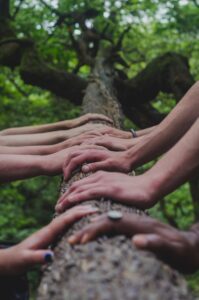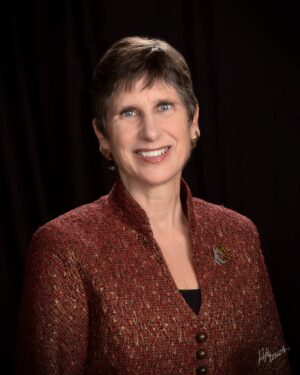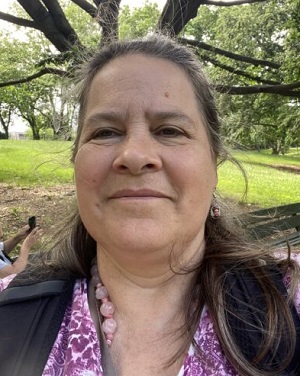New Online Course for Humanist Families and Communities
 Photo by Shane Rounce on Unsplash
Photo by Shane Rounce on Unsplash The American Humanist Association’s Center for Education is thrilled to share our latest online studies on Humanist Family Life Ceremonies. This free, self-guided course offers guidance for meaningful practices and celebrations that families and communities of all kinds can explore, adopt, revise, and create together to express their relationships and values. Get to know co-authors Dr. Anne Klaeysen and Audrey Kindred:
Why is this course important to you?
Anne Klaeysen: When my husband and I became parents, I knew that we would need help—not only with practical concerns like childcare but also, and more importantly, with finding and joining a values-centered community. I received that help from the Brooklyn Society for Ethical Culture and our local elementary school, religious and educational institutions in our neighborhood whose members, parents, and teachers shared our love of children and took ethics seriously. This course is a resource for families like ours who may not so readily find such communities in their neighborhoods; who are forming their own communities and are looking for ways to express and celebrate their values. It was important to me as a young parent for my own family, and it’s important to me now as an elder in my community.
Audrey Kindred: I feel strongly about this work, and its potential to actually change the world in positive, essential, and sustainable ways. This course represents a culture that honors creativity, sustainability, and humanity. For me, this course helps me share decades of work I’ve done with families (through Ethical Culture, yoga and arts teaching, community organizing, etc.). I have learned so much and look forward to learning more from people who engage in the work, and want to share their reflections and discoveries. The process of writing for this course was a really wonderful opportunity to work closely with Dr. Anne Klaeysen in a new way and get to know the American Humanist Association from the inside.
What do you want people to know about the course?

Anne Klaeysen
Anne Klaeysen: You, too, can find and contribute to, or form, communities that support your family and create ceremonies that reflect and celebrate your values. You’re not alone. This course is easily accessible and designed to lead you through a process of identifying what is important to you and how to communicate it in meaningful and playful ways.
Audrey Kindred: I want people to know that I think it’s hard, noble work to stay grounded in this world full of modern challenges, dogmas, and overwhelms. I want this course to help people know that their own creative and homemade way in the world is precious, and that they are unique, but not alone, in yearning to make deep meaning in new ways. I want people to know that our personal choices make a big difference in this world, and that it is important to take that seriously. I want us all to realize that there are ripples of worldwide consequences to the decisions we make that we think are small and personal. I want us to be inspired to be accountable for that, and inspired to be creative with it.
What is your favorite part of the course?
Anne Klaeysen: I especially like the “Taking Stock” questions that help people frame and dig into their experiences. The conversations elicited by these questions, and the answers that will change over time, are at the heart of every event that is planned.
Audrey Kindred: Green Halloween is a favorite section for me. Green Halloween is an invitation to families to stop buying into the commercial cloning process of Halloween costuming, and to get silly, messy, creative workshop processes going to invent costumes with recycled materials. This is an amazing practice that doesn’t have to stay restricted to Halloween, but I think we can consider how to stop being dominated by the commercialism of holidays and really welcome creative processes that help us re-envision used stuff into new creation.
What was the hardest part about developing it or the hardest section to write?
Anne Klaeysen: The hardest part was stopping to edit because we wanted to include more.

Audrey Kindred
Audrey Kindred: For me the hardest thing was toning down some of the urgency that I have around the themes of greening our lives and protecting ourselves from commercialism. I don’t want people to feel guilty about buying something they want, but the truth is I want us to think twice about what we buy. I guess the other hard part for me might be that I have not raised a family myself. I have just worked with hundreds of them and have felt like a collaborator in the process. However, I have learned from the many that parenting is not always the inspired process we might wish it to be. It is, of course, often an exhausted process as well. I have learned that there needs to be room in everything we do for things to go differently than we planned. This speaks to a process-oriented perspective that I try to highlight in this course a lot.
How can humanist communities better support children and/or families?
Anne Klaeysen: Provide more materials and trained facilitators, offer more courses like this one, and promote them widely. Make sure that every chapter, congregation, and community intentionally includes intergenerational programming.
Audrey Kindred: Let’s learn to play together with humanist intentionality! Let’s create the peace play on earth that is made through proactive creativity, conflict resolution, and mutual wonder, rather than just protest. Let’s demonstrate that humanism can be intersectional and inclusive of diverse perspectives and visions and cultures, by inviting people to be included.
The new Humanist Family Life Ceremonies online studies is included in our free course offerings. You can access all the topics by registering on the Center for Education website with your email, or logging in if you already have an account. And join our last 2023 Speaking of Humanism Zoom Webinar on Tuesday, December 12, at 6:30pm to learn about the course and humanist celebrations with co-author Anne Klaeysen.
